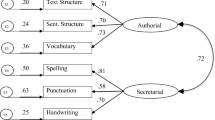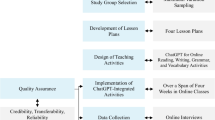Abstract
The present study investigates how learners listen when reflecting on their metacognitive knowledge in L2 (second language) listening. Metacognitive knowledge elicits how learners process, control, or direct their listening approach. The intervention in a pre-sessional English for Academic Purposes (EAP) program consisted of five listening lessons delivered to two groups: self-led learners (n = 13) and classroom instruction learners (n = 11). Qualitative data, collected through listening journals and focus groups, show the learners’ person, task, and strategy knowledge. The results showed that after receiving metacognitive instruction, both groups approached using the listening tasks differently but identified the same difficulties. Classroom instruction learners used peer discussions, while self-led learners prioritized vocabulary activities to understand the listening text. Both groups found resource familiarity and topic knowledge helpful for their listening comprehension but had difficulties taking notes while listening. These findings indicate how learners can use metacognitive knowledge to address their individual learning needs to help their listening comprehension.
摘要
本研究藉由讓學習者反思L2聽力的後設認知知識以探討學習者是如何進行聽力的。後設認知知識引出了學習者如何處理、控制或指引他們的聽力方法。學期前的學術英語(EAP)課程的介入包含了為兩組學生提供五堂聽力課:自主學習者(n=13)和課堂教學學習者(n=11)。透過聽力日誌和焦點小組搜集的質性數據顯示了學習者個人、任務和策略知識。研究結果顯示,在接受後設認知指導後,兩組學生以不同的方法進行聽力任務,但均發現相同的困難。課堂教學學習者使用同儕討論,而自主學習者則優先使用字彙活動來理解聽力文本。兩組學習者都認為資源熟悉度和主題知識有助於他們的聽力理解,但邊聽邊記筆記均有困難。這些研究結果顯示,學習者可以利用後設認知知識來滿足個人的學習需求,以幫助他們的聽力理解。

Similar content being viewed by others
Data Availability
Materials have been provided in the appendices section. Readers can also contact the author for further examples from the dataset.
References
Braun, V., & Clarke, V. (2006). Using thematic analysis in psychology. Qualitative Research in Psychology, 3(2), 77–101. https://doi.org/10.1191/1478088706qp063oa
Chen, C. W. (2016). Listening diary in the digital age: Students’ material selection, listening problems, and perceived usefulness. JALT CALL Journal, 12(2), 83–101. https://files.eric.ed.gov/fulltext/EJ1112424.pdf
Chen, C. W. Y. (2019). Guided listening with listening journals and curated materials: A metacognitive approach. Innovation in Language Learning and Teaching, 13(2), 133–146. https://doi.org/10.1080/17501229.2017.1381104
Clarke, V., & Braun, V. (2013). Teaching thematic analysis: Overcoming challenges and developing strategies for effective learning. The Psychologist, 26(2), 1–13. https://uwe-repository.worktribe.com/preview/937606/Teaching%20
Coskun, A. (2010). The effect of metacognitive strategy training on the listening performance of beginner students. Novitas-ROYAL (Research on Youth and Language), 4(1), 35–50. https://files.eric.ed.gov/fulltext/ED509339.pdf
Cross, J. (2011). Metacognitive instruction for helping less-skilled listeners. ELT Journal, 65(4), 408–416. https://doi.org/10.1093/elt/ccq073
Dornyei, Z. (2007). Research methods in applied linguistics.
Field, J. (2004). An insight into listeners’ problems: Too much bottom-up or too much top-down? System, 32(3), 363–377. https://doi.org/10.1016/j.system.2004.05.002
Field, J. (2009). Listening in the language classroom. Cambridge University Press.
Flavell, J. H. (1979). Metacognition and cognitive monitoring: A new area of cognitive–developmental inquiry. American Psychologist, 34(10), 906–911. https://doi.org/10.1037/0003-066X.34.10.906
Flowerdew, J., & Miller, L. (2005). Second language listening: Theory and practice. UK: Cambridge University Press.
Gagen-Lanning, K. (2015). The effects of metacognitive strategy training on ESL learners' self-directed use of TED Talk videos for second language listening. [Iowa State]. https://dr.lib.iastate.edu/entities/publication/192dfb6f-994b-42cc-a2e3-b4986fc618b4/full
Goh, C. (1997). Metacognitive awareness and second language listeners. ELT Journal, 51(4), 361–369. https://doi.org/10.1093/elt/51.4.361
Goh, C. (2000). A cognitive perspective on language learners’ listening comprehension problems. System, 28(1), 55–75. https://doi.org/10.1016/S0346-251X(99)00060-3
Goh, C., & Hu, G. (2014). Exploring the relationship between metacognitive awareness and listening performance with questionnaire data. Language Awareness, 23(3), 255–274. https://doi.org/10.1080/09658416.2013.769558
Goh, C., & Taib, Y. (2006). Metacognitive instruction in listening for young learners. ELT Journal, 60(3), 222–232. https://doi.org/10.1093/elt/ccl002
Goh, C., & Vandergrift, L. (2018). Introduction to listening. In J. M. Newton, D. R. Ferris, C. C. Goh, W. Grabe, F. L. Stoller, & L. Vandergrift (Eds.), Teaching English to second language learners in academic contexts: Reading, writing, listening, and speaking (pp. 123–144). Routledge.
Graham, S. (2006). Listening comprehension: The learners’ perspective. System, 34(2), 165–182. https://doi.org/10.1016/j.system.2005.11.001
Graham, S. (2007). Learner strategies and self-efficacy: Making the connection. Language Learning Journal, 35(1), 81–93. https://doi.org/10.1080/09571730701315832
Kemp, J. (2009). The listening log: Motivating autonomous learning. ELT Journal, 64(4), 385–395. https://doi.org/10.1093/elt/ccp099
Lee, Y., & Cha, K. (2017). Listening logs for extensive listening in a self-regulated environment. Asia Pacific Education Resource, 26(5), 271–279. https://doi.org/10.1007/s40299-017-0347-0
Lynch, T. (2011). Academic listening in the 21st century: Reviewing a decade of research. Journal of English for Academic Purposes, 10(2), 79–88. https://doi.org/10.1016/j.jeap.2011.03.001
Newton, J., & Nation, I. S. P. (2020). Teaching ESL/EFL listening and speaking (2nd ed.). UK: Routledge.
Rahimi, M., & Katal, M. (2012). Metacognitive listening strategies awareness in learning English as a foreign language: A comparison between university and high-school students. Procedia-Social and Behavioral Sciences, 31, 82–89. https://doi.org/10.1016/j.sbspro.2011.12.020
Rahimirad, M., & Moini, M. R. (2015). The challenges of listening to academic lectures for EAP learners and the impact of metacognition on academic lecture listening comprehension. SAGE Open, 5(2), 1–9. https://doi.org/10.1177/2158244015590609
Renandya, W. A., & Farrell, T. S. (2011). Teacher, the tape is too fast! Extensive Listening in ELT. ELT Journal, 65(1), 52–59. https://doi.org/10.1093/elt/ccq015
Roe, L. (2013). Designing and evaluating an e-listening component for an EAP context. CLESOL 2012: 13th National Conference for Community Languages and ESOL,
Rost, M. (2011). Teaching and researching: Listening. UK: Routledge.
Shang, H. F. (2008). Listening strategy use and linguistic patterns in listening comprehension by EFL learners. The International Journal of Listening, 22(1), 29–45. https://doi.org/10.1080/10904010701802147
Siegel, J. (2020). Effects of notetaking instruction on intermediate and advanced L2 English learners: A quasi-experimental study. Journal of English for Academic Purposes, 100868. https://doi.org/10.1016/j.jeap.2020.100868
Siegel, J. (2013). Second language learners’ perceptions of listening strategy instruction. Innovation in Language Learning and Teaching, 7(1), 1–18. https://doi.org/10.1080/17501229.2011.653110
Siegel, J. (2014). Exploring L2 listening instruction: Examinations of practice. ELT Journal, 68(1), 22–30. https://doi.org/10.1093/elt/cct058
Siegel, J. (2015). Exploring listening strategy instruction through action research. Springer.
Siegel, J. (2016). Listening vocabulary: Embracing forgotten aural features. RELC Journal, 47(3), 377–386. https://doi.org/10.1177/0033688216645477
Takaesu, A. (2013). TED Talks as an extensive listening resource for EAP students. Language Education in Asia, 4(2), 150–162. https://doi.org/10.5746/leia/13/v4/i2/a05/takaesu
Tsui, A. B. M., & Fullilove, J. (1998). Bottom-up or top-down processing as a discriminator of L2 listening performance. Applied Linguistics, 19(4), 432–451. https://doi.org/10.1093/applin/19.4.432
Vandergrift, L. (2003). Orchestrating strategy use: Toward a model of the skilled second language listener. Language Learning, 53(3), 463–496. https://doi.org/10.1111/1467-9922.00232
Vandergrift, L. (2008). Learning strategies for listening comprehension. In S. Hurd & T. Lewis (Eds.), Language learning strategies in independent settings 1 (pp. 84–102). Multilingual Matters.
Vandergrift, L., & Goh, C. (2012). Teaching and learning second language listening: Metacognition in action. UK: Routledge.
Vandergrift, L., Goh, C., Mareschal, C. J., & Tafaghodtari, M. H. (2006). The metacognitive awareness listening questionnaire: Development and validation. Language Learning, 56(3), 431–462. https://doi.org/10.1111/j.1467-9922.2006.00373.x
Vandergrift, L., & Tafaghodtari, M. H. (2010). Teaching L2 learners how to listen does make a difference: An empirical study. Language Learning, 60(2), 470–497. https://doi.org/10.1111/j.1467-9922.2009.00559.x
Yeldham, M., & Gruba, P. (2016). The development of individual learners in an L2 listening strategies course. Language Teaching Research, 20(1), 9–34. https://doi.org/10.1177/1362168814541723
Zeng, Y., & Goh, C. (2015). Learners' level of metacognitive awareness and its relationship with listening performance. In 2015 IEEE 15th international conference on advanced learning technologies (pp. 345–349). https://doi.org/10.1109/ICALT.2015.79
Zhang, Y. (2012). The impact of listening strategy on listening comprehension. Theory and Practice in Language Studies, 2(3), 625–629. https://doi.org/10.4304/tpls.2.3.625-629
Author information
Authors and Affiliations
Corresponding author
Ethics declarations
Ethical Approval
This study received approval from the Victoria University of Wellington HEC (Human Ethics Committee), number: (HEC# 26929).
Competing Interests
The author declares no competing interests.
Rights and permissions
Springer Nature or its licensor (e.g. a society or other partner) holds exclusive rights to this article under a publishing agreement with the author(s) or other rightsholder(s); author self-archiving of the accepted manuscript version of this article is solely governed by the terms of such publishing agreement and applicable law.
About this article
Cite this article
Madarbakus-Ring, N. Learner Reflections: Metacognitive Knowledge Approaches in L2 Listening Instruction. English Teaching & Learning (2024). https://doi.org/10.1007/s42321-024-00177-w
Received:
Revised:
Accepted:
Published:
DOI: https://doi.org/10.1007/s42321-024-00177-w






